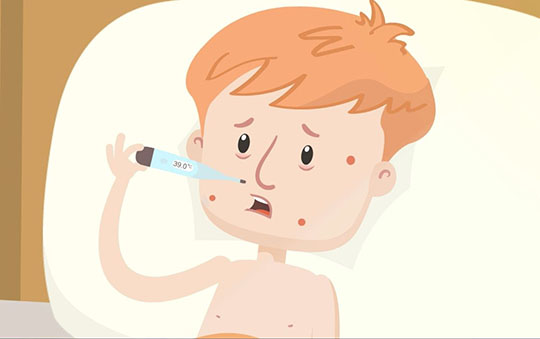A new social media video launched today by the Public Health Agency (PHA) highlights the importance of getting the Measles, Mumps and Rubella (MMR) vaccine, particularly given recent measles outbreaks in continental Europe.
Dr Jenny Mack, Specialty Registrar in Public Health at the Public Health Agency, said: “Measles is one of the most infectious viral diseases known. It spreads either through direct contact with an infected person or through the air when the patient coughs or sneezes.
“It causes high fever and rash that usually passes in about seven to ten days without causing further problems, but it can also be very serious, with some people developing complications, such as infections of the ears, lungs (pneumonia) and brain (encephalitis).
“Unfortunately, people can die from measles. The video aims to highlight the signs and symptoms and inform that the safest and most effective way to prevent measles is to ensure you are fully vaccinated with the MMR vaccine.”
Due to lower levels of MMR vaccine uptake in children and young people in some countries, measles continues to circulate. Anyone who has not received two doses of MMR vaccine is at risk, with those travelling to and from France, Italy, Greece, Romania, England and Republic of Ireland, where there are currently large outbreaks of measles, at a particularly high risk.
Dr Mack continued: “The MMR vaccine has proven to be a safe and effective way to help protect against measles, mumps and rubella. In the fifty years since the first measles vaccine was introduced in the UK it is estimated that 20 million measles cases and 4,500 deaths have been averted.
“Thanks to the high proportion of people in Northern Ireland making the positive decision to get the MMR vaccine over the past decades, cases of these three illnesses here have fallen significantly. However, these diseases have not gone away and some countries are experiencing outbreaks of measles.
“Until measles is eliminated globally we will continue to see imported cases of measles across the United Kingdom and Republic of Ireland. Ensuring your children have had two doses of MMR vaccine will give them the best protection here and when travelling abroad.
“The MMR vaccine is available free of charge as part of the routine immunisation schedule. Children should receive one dose of MMR just after their first birthday and a second dose at three years and four months of age. Anyone who is not sure if they are fully-vaccinated should check with their GP practice. If you haven’t had your kids vaccinated, contact your GP surgery to make arrangement for them to get the MMR and help to provide them and those around them with the best protection.”
The initial symptoms of measles can include:
• a runny or blocked nose
• sneezing
• sore, red eyes that may be sensitive to light
• a high temperature (fever)
• a cough.
A few days later, a red-brown blotchy rash will appear. This may start on the head or upper neck, before spreading outwards to the rest of the body.
Measles is very infectious so it is important that anyone with suspected measles should avoid a situation where they can spread the disease, such as a GP’s waiting room or an emergency department waiting room. People should therefore phone in advance and get advice rather than turning up to these venues.
To view the video see: www.pha.site/MMRvimeo
For more information on measles, mumps and rubella see www.pha.site/mmr


























